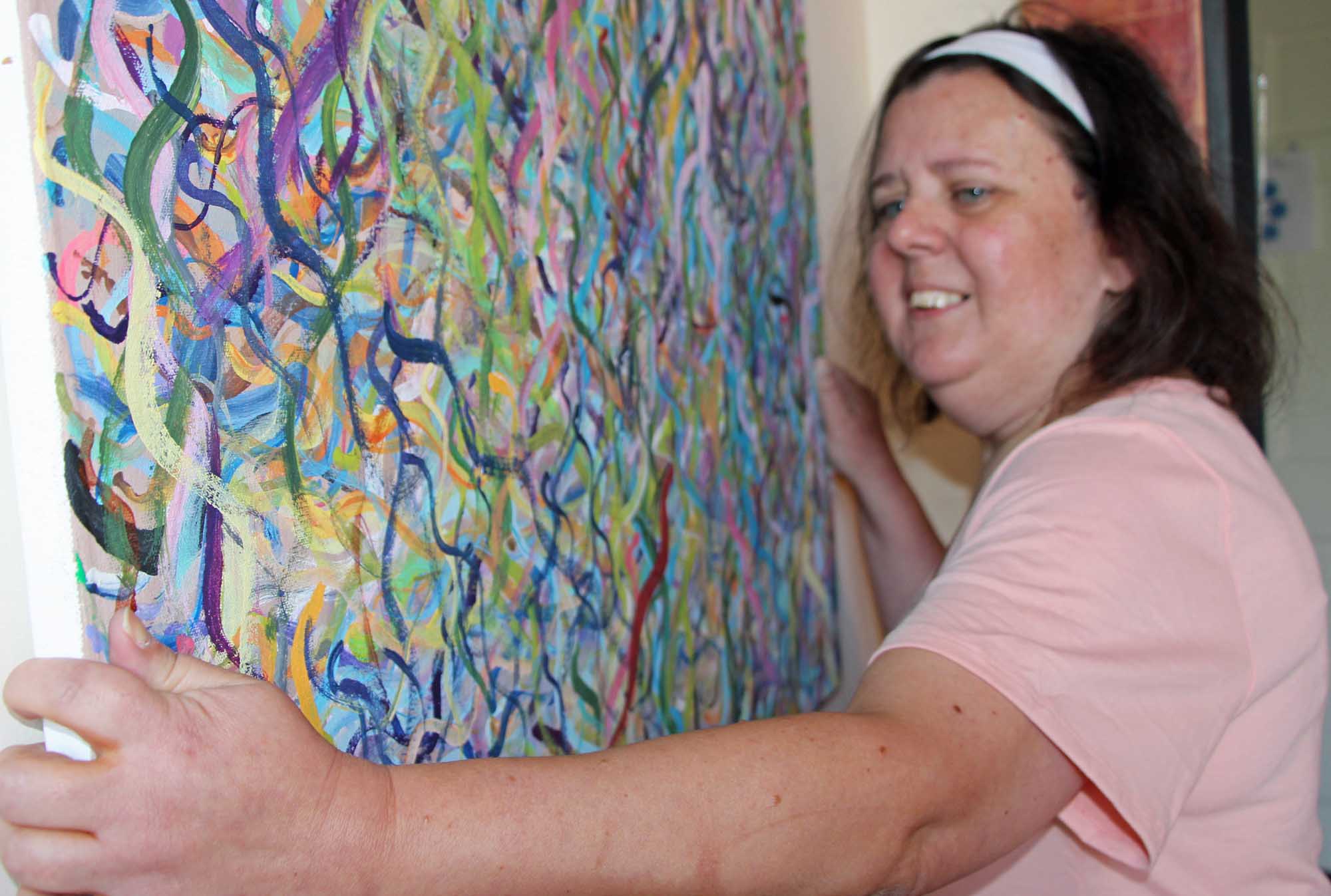Artist And Others Who Rely On State-Funded Support Speak Up For What Matters To Them
/By Gina Macris
Most people don’t give a second thought to what it takes to meet a friend for coffee or a shopping foray. They just call or text and go.
But for Wendy LeBeau, a Rhode Islander living with the challenges of developmental disabilities, arranging a casual get-together is a big deal. She’d have to get someone to drive, not so easy when her schedule of state-funded supports allows limited time for one-on-one service.
On Aug. 7, LeBeau joined some 50 people at an event space next to The BRASS in Warren– an art gallery where she works – for the first of several “Community Conversations” sponsored by the Community Provider Network of Rhode Island, a trade association of private service providers that support adults with developmental and intellectual challenges.
When LeBeau was asked about her ability to connect with friends, she replied “only at work.” She is a contributing artist at The BRASS, where she has created abstract canvases of dancing, swishing color.
The work of LeBeau, which features a carefully chosen palette and controlled style that belies the flowing compositions, has been shown at the National Portrait Gallery at the Smithsonian Institute and an annual Art Ability exhibit at Bryn Mawr Rehab Hospital in Philadelphia.
LeBeau’s comments, as well as those of others, put a face on what it means to depend on others to arrange even a simple outing.
The remarks responded to questions posed by Donna Martin, executive director of CPNRI, who made her way around the audience, asking individuals seated in a huge circle of chairs to share their experiences, including any barriers they faced to feeling included in their communities.
In various ways, LeBeau and others pointed to a common underlying theme – a shortage of qualified staff available to individualize services so that adults with developmental disabilities may access their communities for work and leisure, as envisioned by the Americans With Disabilities Act.
Margaret, who uses a wheelchair, said as much: “We need more staff.”
Since a $26 million funding cut by the General Assembly forced private service providers to slash wages in 2011, the field has been plagued by high turnover and difficulty among employers in recruiting and retaining new staff. At the same time, a federal consent decree in effect since 2014 requires more training and professionalism in the way adults with developmental disabilities receive support services.
Since 2011, there have been a few incremental wage increases, but the field of direct care has not recovered.
Martin puts the current average pay for direct service workers at about $11.45 an hour. That’s $1.30 above the minimum wage of $10.10. Rhode Island’s minimum wage is set to increase to $10.50 January 1, 2019, but the pay for those who work with adults with developmental disabilities will remain the same.
Darlene Faust, Director of Self-Advocacy and Work Preparedness at Looking Upwards, cited the labor shortage and a lack of adequate transportation as barriers to inclusion.
She said her agency recently lost a staff member to Walmart.
After the meeting, Faust elaborated on the staffing situation. When workers call in sick, she said, she and others in management often must fill in to provide direct support, because the back-up pool is so small.
And when the agency is short-staffed, trips into the community must be prioritized. Clients must get to their doctors’ appointments and to their jobs no matter what, she said.
Faust has worked with adults with developmental disabilities for 20 years, she said, because “I love it.”
But the struggles are “heartbreaking right now,” she said. “We’re all in it together. It’s all the same community, whether you’re providing service or receiving support.”
“People outside the community don’t always understand,” she said.
A number of people who spoke in American Sign Language said that a lack of interpreters posed barriers in various areas of daily living, including their ability to find jobs.
Meanwhile, a Woonsocket man who called himself Tim said he is 28 and has been looking for work since he was in high school.
Although several prominent corporate employers have taken the lead in hiring adults with developmental disabilities in Rhode Island, Tim said he believes there is still “a lot of prejudice out there” against taking on workers who face intellectual or developmental challenges.
He said it would be helpful if agencies providing employment supports could offer “task-oriented vocational training” to job seekers before they actually apply for a particular position.
The “community conversation” is the first of five such meetings planned by CPNRI in the coming months to cultivate and encourage sustained grass-roots advocacy on issues affecting anyone with a stake in services for adults with developmental disabilities, Martin said after the meeting.
The schedule for the remaining conversations, in different areas of the state, is still being finalized, she said.
CPNRI also plans candidate forums for legislative and gubernatorial candidates after the September primary elections, Martin said.
In a show of hands, about two thirds of the audience indicated they were registered to vote, including most of those who receive services funded by the state.







